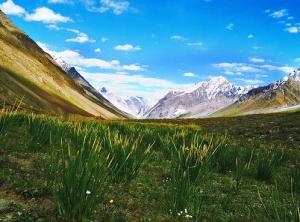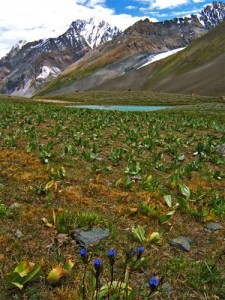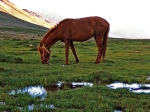تین جیپیں— دریاۓ گلگت کے اوپر— جو ابھی دھوپ چھاؤں میں تھا— ڈنکی کاروں کی طرح بل کھاتی ہوئی دھول اڑاتئ چلی جا رہی تھی.
تریوی فوارے میں پڑے ہوئے سکّوں کی طرح ان تینوں جیپوں میں بھی خواہشیں تھیں.
یہ خواہشیں وادئ اشکومن کو جا رہی تھیں
Three jeeps – above the Gilgit River — which lied now in sunshine or in shade — like dinky cars winding their way raising clouds of dust.
Like coins in the bottom of a fountain, these three jeeps contained wishes…
These wishes were traveling to Ishkoman…
—
عشق اور اشک ایک ہی چیز کے دو نام ہیں اور اشکومن–گلگت سے تقریبا” اسی کلومیٹر کے فاصلے پر وادئ نلتر اور وادئ یاسین کے درمیان میں واقع ہے
Ishq (love) and Ashk (tear) are two names of the same thing and Ishkoman — it lies nestled between the Naltar and Yaseen Valleys, at a distance of nearly 80 km from Gilgit.
And so begins the epic journey in search of yaks and of an azure lake, lost somewhere beyond the Hindu Kush and deep into the Pamirs’ region.
Ever since the beginning of this month, I have been wishing to do a post on Mustanser Hussain Tarar’s beautiful book Yak Sarai. What more beautiful and earnest way to remember and honour our country of disputes than to relish the memories of a journey that all readers of this book have travelled in the company of this excellent author.
So here is to Pakistan in this most august of months.
The inspiration
The journey really begins with Mustanser coming across the picture of a very beautiful and intense blue lake on the office table of the famous Pakistani mountaineer Nazir Sabir. He immediately falls in love with it and starts planning for the unfamiliar trek on which nobody he knows, except Ashraf Aman, has ever gone before.
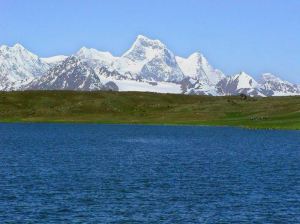
Other inspirations are added up. Rasool Hamza Tov, the poet of Daghistan, who captivates Mustanser’s heart with his sad and piercing poem of love…
اور اگر تم تنہا ہو— اکیلی ہو
اور کوئی بھی تمہاری محبت میں مبتلا نہیں ہے–
تو یقین کرلینا کہ–
کہیں بلند پہاڑوں میں— رسول حمزہ توف– مرگیا ہے
And if you are alone — lonely
And there is nobody in love with you—
Then believe
That somewhere high in the mountains—
Rasul Hamza Tov lies dead.
It is easy for the highly sensitized Mustanser to substitute himself for Tof and to give the place of ‘the woman’ to The Lake. He weaves his readers so in the web of his feelings that we get to develop a similarly exhilirating anticipation to meet the Lake.
وہ جھیل بھی تو اس آوارہ گرد کی خواہش کرتی ہے کہ وہ آۓ اور اسے دریافت کرے— اس کے پانیوں میں مل کر ایک نئی اور انوکھی مہک کو وجود میں لاۓ— کسی ایک آوارہ گرد کے لئے
Doesn’t the lake also longs for the wanderer to come and discover her— to create a new and strange scent by mixing with her waters— for one particular wanderer…
And the American trekker Kim O’Neil who, with her husband, was writing a Lonely Planet Travel Guide Book on the Pakistan North. Mustanser consulted her as someone who had been to the Lake and she told Mustanser the stories of a fairyland jungle…
وہاں سویرے سویرے ایک درخت سے دوسرے درخت پر ایسے پرندے اڑان کرتے ہیں جو تم نے کبھی نہیں دیکھے ہوں گے– میں نے ان پرندوں کی تصویریں کسی بھی برڈ انسائیکلوپیڈیا میں نہیں دیکھیں– ایسا محسوس ہوتا ہے جیسے وہ اس لمحے تمہارے لئے بنا کر وہاں چھوڑ دیے گئے ہوں– ان کی رنگ دار دمیں پرواز کے دوران ہماری ناک کو چھوکر گزر جاتی ہیں— اور ان کی آوازیں، ایسی کہ صرف پہلی محبت میں سنائی دی ہوں گی– وہ ان زبانوں میں چہچہاتے ہیں جو ابھی ایجاد نہیں ہوئیں
There, in the early hours of dawn, birds you have never seen will be flying from one tree to another– I have not seen their pictures in any bird encyclopedia– It seems they have been created and released there just then for your sake– their colorful tails touch our noses during their flights— and their voices are those heard only in the moments of first love– they chirp in languages that haven’t been invented yet.
The Ishkoman Valley
Mustanser, with a band of vagabond-hearts like him, arrives from Gilgit in jeeps at Chatorkhand in the Ishkoman valley, the beginning point of the trek.
After a brief stay at Chatorkhand, they abandon jeeps at Immat on their way to Mitran Das. From here they will be on foot.
وادی تنگ تھی اور ہم اس میں دریا کی قربت اور آبشاروں کے شور میں گھرے ہوۓ— ایک نامعلوم منزل کی طرف نیم تاریکی میں قدم اٹھاتے تھے
The valley was narrow and we were surrounded in the bustle of its falls in the nearness of its river— striding towards an unknown destination in semi-darkness.
—
شہری آسائشوں نے اور عمر کے زوال نے میرے بدن کی ڈالیوں پر گھونسلے بنا رکھے تھے اور ان میں تھکاوٹ اور پژمردگی کے پرندے بولتے تھے
Urban luxuries and downfall of the body had settled their nests on the branches of my body, in which birds of weariness and lassitude spoke…

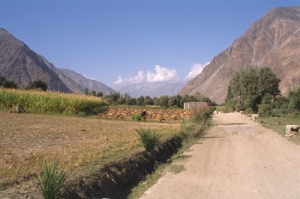
یہاں ہمارے سامنے ایک دھند تھی جس میں صرف سوخترآباد کا سوختہ چہرہ— کبھی کبھار خیال میں نظر آجاتا یا جھیل کرومبر کے نیل و نیل پانی اپنی چھب دکھلاتے لیکن ان کے سوا دھند کے دبیز پردے تھے اور ان میں جو کچھ پوشیدہ تھا صرف تب ظاہر ہونا تھا جب ہم نے وہاں پہنچنا تھا—کوئی گائیڈ بک ہمارا راستہ متعین نہیں کرسکتی تھی، کوئی گائیڈ ہمارا ہاتھ تھام کر ہمیں وہاں نہیں لے جاسکتا تھا
Here, a fog hung before our eyes. In it we sometimes the dry face of Sokhtarabad will show itself or the azure waters of Lake Karamber will shine. Apart from that there was nothing but thick curtains of mist. Whatever hid beyond will reveal itself only when we reached it. No guidebook could outline our route– no guide could hold our hand and take us there.
Beyond from Mitran Das, they have to cross the Karamber Glacier concealed beneath a mountain, hoping to reach a beautiful green valley in Mitran Das for the night.
کہیں آگے ایک مقام تھا جہاں ہم نے آج کی شب کے لئے پڑاؤ کرنا تھا— کسی منزل نامعلوم کی میں— اور اجنبی وادی کی نہ دکھتی ہوئی آبشاروں کے آس پاس— ہمارے خیمے نصب ہونے تھے– اور یہی نامعلوم اور اجنبیت ہی اصل کرشمہ تھا جو شہر میں، شہرت کی زندگی میں مجھے بلاتا ہے
Somewhere beyond was the place where we had to camp for the night—in some unknown destination—near the unseen falls in some foreign valley—our tents had to be raised– Indeed, this strangeness was the charisma which calls me away from a life of renown in the city.
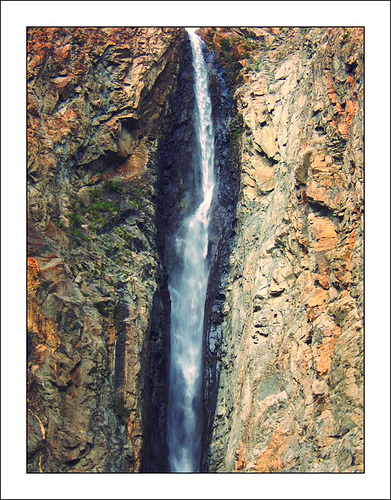
شام کی سیاہ بلّی کی آہستہ خرامی کے پہلو بہ پہلو خنکی بھی ایک بے آواز چور کی طرح مترن داس کی گھاس پر اترنے لگی
الله اکبر—الله اکبر— شام کی اس ٹھنڈک میں مترن داس کی آبشاروں تک پہنچتی ایک صدا آئی.
بقا عصر کی ازاں دے رہا تھا.
اس پر فریب تنہائی اور دل کشی میں جو نماز کے لئے کھڑے ہوئے وہ ثواب اور عذاب سے ماورا ہوکے اپنی مرضی اور بے اختیاری سے کھڑے ہوئے—کہ یہی جی چاہتا تھا
Like a quiet thief, a chill sneaked in on the grass of Mitran Das, along side the slow-moving black cat of the evening.
Allahu Akbar — Allahu Akbar — A call reached the waterfalls of Mitran Das in this cool eve. Baqa was calling for the Asr prayer. Those who stood to pray in this alluring solitude were indifferent to reward or penalty — that had stood with an unsolicited fervor, as this is what every heart was full of.
Here for the first time we encounter the beautiful poetry of the native mountain people, sung around bonfire by the vivacious porters at the end of a long day…
ندی تم نے جھوٹ بولا تھا—
اے گلیشئیر کی بیٹی تم نے جھوٹ بولا تھا—
میں تمہارے کناروں پر— برسوں رویا اور تم نے کہا وہ نہیں آۓ گی–
بلندیوں پر جو مارخور تھے وہ مجھے دیکھتے تھے اور غم زدہ ہوتے تھے—
میرے آنسوؤں سے آبشاروں کا پانی بڑھ گیا—
اور تم نے کہا — وہ نہیں آۓ گی–
اور وہ آئی—
اور میں اسے یہاں– مترن داس میں تمہارے کناروں پر لے کر آیا–
اس کے بدن میں وصل کی مہک تھی-
وہ مجھ سے کچھ کہتی تھی— پامیر کی بلندیاں گواہ ہیں-
لیکن آبشاروں اور ندیوں کے شور میں اس کی آواز مجھ تک نہیں پہنچتی تھی—
وہ گہنوں سے لدی تھی اور ایک شہزادی کی طرح تھی–
اے گلیشئیر کی بیٹی تم نے جھوٹ بولا تھا
O stream, you had lied
O daughter of glaciers, you had lied
I wept for years on your banks and you said she wouldn’t come
The markhors on the highlands looked at me and were saddened
My tears increased the waters of the falls
And you said – she would not come
And she came
And I brought her here – on your banks in Mitran Das
Her body carried the fragrance of union
She said something – the peaks of the Pamirs are witness
But in the clamor of falls and streams her voice did not reach me
She was encircled in garlands and was like a princess
O daughter of the glaciers, you had lied.
The next day they face the most strenuous part of the trek. Ferocious streams, perishing footways beside an unfriendly river, “death galleries” and more…
کہیں بلند پہاڑوں میں—
کہیں دنیا کی چھت کےآس پاس—
کوہ پامیر کو جانے والے کوہستانی دروں کی قربت میں—
وادئ اشکومن کی آخری حدوں پر، ورگوتھ گلشئیر کے قدموں میں—
درّہ چلنجی کی برف کی نزدیکی میں—
دریاے شین کی لگامیں تڑوانۓ والی پرشور وحشت کی کنارے—ایک ڈھلتی شام میں—
سارے دن کی کوہ نوردی کی مشقت سے آزردہ بدن کی تھکاوٹ میں ٹوٹتے ہوئے میں نے اپنے اوپر سایہ کرتی اس چٹان کو سر اٹھا کر دیکھا جو پچاسی درجے کی زاویے پر مجھ پر بلند ہورہی تھی
Somewhere in the high mountains
Near the roof of the world
In the closeness of those mountain passes that go to the Pamirs
At the feet of Virgoth glacier, towards the last boundaries of the Ishkoman
Near the snows of Chilinji Pass
On the bank of the noisy strap-breaking wildness – in settling dusk
Breaking with the tired body of a day’s trekking exertion I lifted my head high to look at the rock rising above me at the angle of fifty degrees…
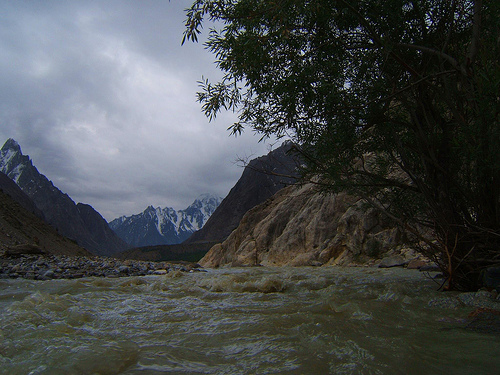
اور وہ تیسری ندی میں اتر گیا– اس کی شدت بیان سے باہر ہے— جیسے دنیا میں ہر شے کا وجود ختم ہوگیا ہے اور ہم پانی کی ایک چنگھاڑتی ہوئی کائنات میں گھرے ہوئے ہیں– […] یہ شور اتنا زیادہ تھا کہ کانوں کہ پردے پھٹتے تھے– پتھروں سے پٹختے پانیوں کی دھند نما پھوار میں شدید سردی تھی، […] میں نے صرف ایک بار سر اٹھا کر ادھر ادھر دیکھا- اوپر سے پانی ایک تباہ کن رفتار سے ریلوں کی صورت گرتے چلے آرہے تھے اور ان کی توجہ کا مرکز صرف ہم دونوں تھے
And he entered the third stream – it’s ferocity was beyond description – as if every thing else in the universe has ceased to exist and we are imprisoned inside a roaring world of water – […] The noise was so intense it was breaking to our eardrums – there was extreme coldness in the misty shower from waters hitting stones, […] I raised my head once to see about me. Waters were falling above us with deadly speed in torrents and the sole focus of their attentions was us.
Despite the challenges, the tenacity, and the blood-drying risks, not all trekking days bring the enticing well-earned reward…
تیز ہوا کی دستک کچن ٹینٹ کے پردوں پر ان پرندوں کی طرح پھڑپھڑانۓ لگی جو خیمے میں داخل ہونے کا راستہ تلاش کرنے میں ناکام رہے تھے— شاید ان کی دمیں لمبی تھیں— شاید وہ بہت دور سے آۓ تھے
The strong breeze was fluttering upon the flaps of the kitchen tent like birds that had been unable to search out an opening to the inside – perhaps their tails were long – perhaps they had come from afar. 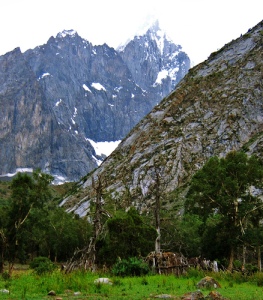
The next day, in view of the Chilanji pass with its glacial mass, they set out for Sokhtarabad, the end of Ishkoman valley. During this relatively peaceful route, Mustanser keeps the anticipation for coming moments alive. The reader experiences every breath with him…
میں سانس لینے کے لیے رکا تو مجھے محسوس ہوا کہ کوئی اور بھی سانس لے رہا ہے— یہاں کون ہے جو میرے سوا ہے— وہاں کوئی تھا جس کے لبادوں کی سرسراہٹ میرے کانوں تک سفر کرتی تھی
As I stopped to recover my breath I felt the hiss of someone else’s breath…. Who else was here but me? – But someone was there and the rustling of his apparel reached my ears.
Sokhtarabad
Crossing and going over a brief and friendly glacier, they descend into Sokhtarabad. At first sight, they may have felt disappointed by its brownness, whereas their eyes had become so used to the spectacular beauty of immeasurable dimensions…
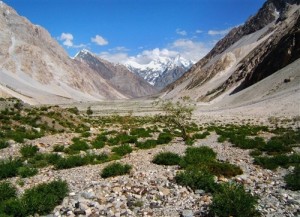
This dry feeling, however, is soon replaced as they discover Sokhtarabad as the nature’s amphitheater offering a grand panorama near the junction of two mountain ranges (the Hindu Kush and the Pamirs). On every step breath-taking spectacles await them. Brown wild growths of stone which will serve as the immediate backdrop of their camp. Distant, they can have a peek of snowy mountains nursing the glacier they have been fearing the whole journey and have yet to encounter. Even when they look back from where they have just come… colorful peaks of Chilanji greet them. They could not have seen these views of the very regions they had emerged from except from Sokhtarabad.
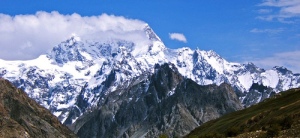
Soon, the tender homeliness of their humble dwelling, it’s people, and it’s history grasp their hearts in a powerful grip of affection. They feel at home.
The prayer at sunset in a spartan mosque on the roof of the world…
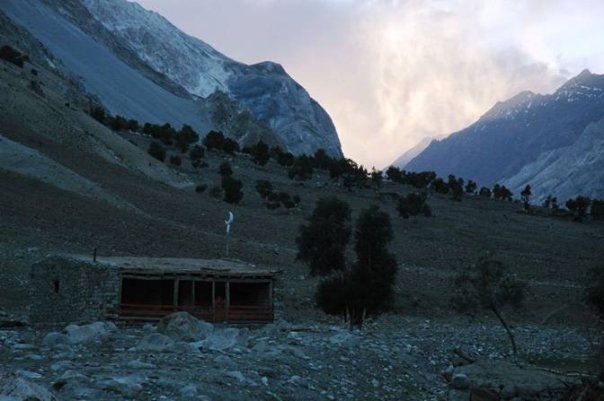
سر جھکانے یا سجدہ کرنے کے لئے جگہ کی قید نہیں ہے- لیکن معبد جتنا عظیم الشان اور سجاوٹ بھرا ہوگا اتنا ہی وہ جھکنے والے کے حواس پر اثر انداز ہوگا اور دل جمعی جو شرط ہے کم ہوگی— اس پتھریلے چناؤ کے بے در کمرے میں کچے فرش پر صرف گھاس تھی اور نیم تاریکی تھی- یہاں جھکتے ہوئے کوئی عمارتی جلال یا شان و شوکت حائل نہ ہوتے تھے- براہ راست ملاقات ہوتی تھی— اور سجدے میں گھاس کی مہک اس ذات کے اور قریب لے جاتی تھی
Bowing before God is not conditional upon place. But the grander the mosque and the fuller with ornamentation, the more it impinges upon the senses of the bowing and will lessen their collectedness. In the doorless and unlit room of this rocky formation the floor was bare except for grass. Architectural grandeur or magnificence did not intervene when bowing here. The meeting was straight. And the fragrance of the grass while prostrating took even closer to Him…
It’s people, a single family headed by an 80+ old man who recounts strange stories of their living involving intricate transactions between man and animal…
ہاں— میں نے کہا ناں کہ ہم جانوروں کو سمجھتے ہیں اور وہ ہمیں سمجھتے ہیں— ہم ایک ہی دنیا میں رہتے ہیں اور ایک دوسرے کی بولی سمجھ لیتے ہیں— ایسا بھی ہوتا ہے کہ کوئی مارخور یکدم پلٹ کر آپ کی طرف ایسی نظروں سے دیکھتا ہے کہ آپ بندوق کی نالی نیچے کرلیتے ہیں- شاید وہ ہمیں ہمارے بچوں کا واسطہ دیتا ہے یا وہ کہتا ہے کہ نہیں ابھی مجھے زندہ رہنے دو اور ہم اسے چھوڑ دیتے ہیں— اور ایسا بھی ہوتا ہے کہ سنوٹایگر سامنے آیا اور ہمارے پاس فرار کا کوئی راستہ نہیں اور وہ ہم پر ایک نظر ڈالتا ہے اور چلاجاتا ہے
Yes – as I have said we understand these animals and they understand us – we live together in one world and understand the other’s tongues – sometimes a markhor turns and looks at you with such eyes that you lower the barrel of your gun. Perhaps he pleads with reference to his offspring or he says: no! let me live and then we let him go – At times we came face to face with a snow tiger and we had no room for escape and yet he throws us a glance and walks away.
The past…
احد کے چچا عبداللطیف آج سے تقریبا” ستر برس پیشتر وہ سامنے— چھوٹے پامیر میں جو ایک ناممکن اترائی دکھائی دے رہی ہے وہاں سے اپنے والد کے گھوڑے پر سوار، ان کی پشت سے چمٹے— جب کہ روسی سرخ کاسک ان کے تعاقب میں تھے— یہیں سے نیچے اترے تھے اور وادئ سوخترآباد کو ازبکستان کے قصبے اوش کے بعد اپنا گھر بنایا تھا
Ahmed’s uncle Abdul Latif came down some seventy years before, from yonder – that almost impossible descent in the small Pamir – on the horse of his father, clinging to his back – with the red Russian Cossacks were in hot pursuit. The Sokhtarabad valley then became their home after the Azbak village of Osh.
The present…
…including an inviting waft of rare Azbak pulao at Chacha Abdul Lateef’s abode, with the promise of Azbak poetry following close upon it’s heels…
In the valleys of the Pamirs – your memory
follows me like a lost sheep
When I set my foot in a chilling cold stream with my load on my back
I am not too indifferent to your memory then…
I have seen a valley here
where no one has yet come
In which I and you will settle together…
Then there will be our children here
And it will be written on their faces…
That they are yours and mine.
—
And the timelessness…
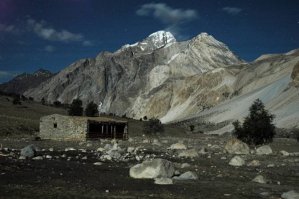
سیاہ گوگلز کے عقب میں محمد لطیف کی آنکھیں بند تھیں، کھلی تھیں یا اپنی عمر کی کڑیاں ملانے میں مصروف تھیں یہ ہم نہیں دیکھ سکتے تھے– […] ہم ان کے ساتھ پچاس برس پیچھے جانے کی کوشش کرنے لگے— […] تب یہ وادی کیسی ہوگی—- اور یہ خیال میں لانا کہ تب یہ وادی کیسی ہوگی چنداں دشوار نہ تھا- جہاں آبادیاں ہوں وہاں […] سبزہ کھیت اور کھلی فضا شاہراہوں اور عمارتوں سے ڈھکے جاتے ہیں اور […] ہر برس ان کی پہچان میں فرق آجاتا ہے— لیکن وادیاں— اگر انسانی دسترس سے دور ہوں- […] ان کے راستے میں مرگ منزلیں ہوں تو وہ صدیوں تک ایسی ہی رہتی ہیں- شاید جنگل میں اس زمانے میں درخت زیادہ ہوں– کم بھی ہو سکتے ہیں– لیکن پتھروں کی اس کائنات میں کوئی ایک پتھر بھی ایسا نہ ہوگا جو صدیوں سے ایک ہی مقام پر نہ پڑا ہو
Behind black goggles Mohammad Abdul Latif’s eyes were closed, or open, or busy tracing the links across his life, we couldn’t tell. […] We were trying to go back fifty years with him – […] What were this valley like then? – And it wasn’t difficult at all trying to imagine what this valley were like then- Where there are settlements […] greenery and open skies are replaced by thoroughfares and skyscrapers and every year their aspect changes – but valleys – if away from human reach- […] with deadly landmarks in their way, remain the same for centuries. Perhaps there were more trees in the jungle then – or less – but there couldn’t be one stone in this universe of rock which was not lying on the same place for centuries.
The departure from Sokhtarabad, then, is like the unwilling severance of ties from home.
ابو عبدللہ نے غرناطہ چھوڑتے ہوئے جب ایک موڑ پر گھوڑے کی باگیں کھینچ کر اس فسوں زدہ شہر پر آخری نگاہ کی تھی تو اس کے لبوں سے ایک آہ نکلی تھی— اور وہ مقام آج بھی “مور کی آخری آہ” کے نام سے جانا جاتا ہے.
ہم نے بھی سوخترآباد پر آخری نگاہ کی— اور اگر ہمارے رخصت ہونے کے برسوں بعد کوئی کوہ نورد اس ٹیلے کی طرف گیا تو اسے کم از کم ہمارے آخری پچھتاوے بھرے سانسوں کی ٹھنڈک ضرور محسوس ہوگی
When leaving Gharnata, as Abu Abdullah pulled the reins of his horse at a turn to take a last look of this fabled city, he sighed – And the place is still known as the “last sigh of the Moor”. We also took a last look of Sokhtarabad – and if years after we left some trekker went towards that knoll, he will feel the chill of our last regret filled sighs.
Ahead on an half-and-hour’s journey from Sokhtarabad they finally come face to face with the climax of the journey — the Chitti boui Glacier — which in local language means: the glacier of huge crevasses.
تاحد نظر برف کا ایک تھما ہوا سمندر جس کے دونوں جانب عجیب شکلوں کی چٹانیں بلند ہورہی تھیں
There was a motionless river of snow as far as the eyes could see. Rocks of strange shapes rose on both it’s sides.

The tale of this crossing classes with the best of narrations of all riskful undertakings and is one of the best parts of the book. They must cross this huge shark of a glacier by climbing to its very top and then descending to the other side…
افق تک اس کی برفوں کے سلسلے تھے تو افق کے پار کیا تھا؟ یہ ہم نہیں جانتے تھے— اور جاننے کے لئے افق کے پار جانا شرط ٹھہرتا تھا–
The succession of its snows flowed into the horizon; so what was across the horizon? We didn’t know that. – But to know that we must go across the horizon….
—
آج تک افق کے پار کون گیا ہے؟
ایک ایسے افق کے پار جس کے ایک جانب—- کوہ پامیر کی بلندیاں ہوں اور دوسری جانب—- کوہ ہندوکش کا جلال اور درمیان میں ہم چلتے ہوں تو کیا ان سنگلاخ پہرے داروں سے پرے جہاں برفیں آسمان میں گم ہوتی ہیں وہاں تک پہنچنا ممکن ہے
Who has ever gone beyond the horizon?
A horizon that on one side is flanked by the heights of the Pamirs and on the other, the majesty of the Hindu Kush with ourselves walking in the middle. So was it possible to reach that high place beside these rocky sentinels where snows mixed with the skies?
The Swinje valley
On the other side of this horizon, they enter the Swinje valley with that single river flowing in its middle that they have been following since Ishkoman. Their dreamed of lake, the source of this river, lies at the end of this valley on another trek-day’s distance away.
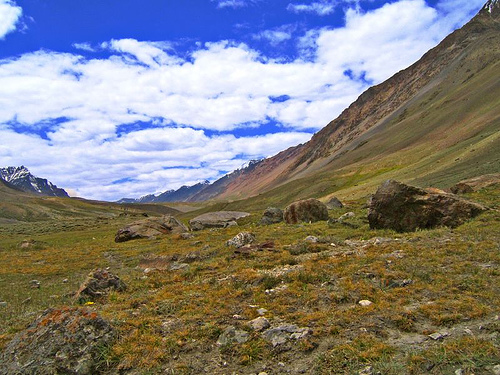
This part of the trek is full of amazing little episodes: delightful ventures, surprising encounters, and the traditional elements of nature — waterfalls, flowers, horses and butterflies — in such new juxtapositions that they are surprising and deeply uplifting at every turn. Mustanser makes all these uplifts come alive by relating to them at a deeply personal level. Whether it’s porters appearing and disappearing in shoulder-high grass, or butterflies upset by the tapping hoofs of the horse, we feel walking and feeling completely in step with him…
پہلے مجھے اس کی پھوار چہرے پر محسوس ہوئی—
جب ہم نے اس بے بہا بلندی پر— جہاں ہم چٹی بوئی گلیشئیر سے بھی اونچے تھے— اس بلندی پر اس مخفی اور تیز پھوار کے آبشار کو دیکھا [—] اور اس کی پھوار ہمارے بدنوں میں اندر تک گئ- ہم روح تک بھیگ گۓ تو ہم سب چپ ہوگئے
First I felt its spray on my face—
When we saw this waterfall of fast and hidden spray on this relentless height – where we were higher then even the Chitti boui […] and its sprinkle made its way till inside our bodies- when we were wet to the very soul, we all fell silent…
کسی بھی حسن کا پرتو کسی بھی تصویر میں نہیں آسکتا– مونا لیزا میں بھی نہیں– کہ اس میں ہونٹوں کی لرزش نہیں ہوتی— اس میں ڈنٹھل پر سرد ہوا میں بہت دھیرج اور آہستگی سے حرکت کرتے ہوئے سٹے دار پھولوں کی بے چینی نہیں ہوتی— ان پھولوں کے لب ایک آسودگی کی آہ کے ساتھ نہیں کھلتے— ان میں کچھ بھی نہیں ہوتا
Beauty cannot be captured in a picture. Not even in the case of Mona Lisa – because the picture does not contain the trembling of her lips… — because there will not be that restiveness of the flowers of long stems swaying gently and languidly in cool air. The flowers in the picture do not unfurl their lips with a sigh of contentment… There is none of this in the picture…
اس وسیح تنہائی میں- الله تعالئ ایک کائنات تخلیق کرنے لگا– اور اس کائنات کی خوبی یہ تھی کہ وہ اس لمحے صرف میرے لیے تخلیق کی جارہی تھی-
میں ایک الگ دنیا کے اندر جارہا تھا جو میرے سامنے وجود میں آ رہی تھی
In this vast expanse of solitude, Allah the Al-mighty was creating a universe. And the quality of this universe was that it was coming into existence just for my sake… I was entering a different world which was taking shape right before my eyes…
—
حسن کا اور آزردگی کا کیا رشتہ ہے؟
اس میں مسرت کم اور پچھتاوا زیادہ کیوں ہے.
اگر حسن— خوبصورتی– اس قسم کا باغ بہاراں سدا نظروں کے سامنے رہے تو کیا پھر بھی آزردگی رہیگی یا اس کی جگہ اکتاہٹ اور یکسانیت لے لے گی— شاید بچھڑجانے کا پھر ملاقات ہو نہ ہو کا خدشہ ہی آزردگی کو جنم دیتا ہے
What’s the connection between beauty and sorrow? Why is there less of glee and more of regret in its enjoyment? If beauty – this kind of an efflorescent garden was to remain always before one’s eyes, will the sorrow persist, or will boredom and monotony replace it? – Perhaps it’s the fear of loosing and of not meeting again that gives rise to the sorrow.
The Lake
Finally at the end of this amazing and other-worldly trip, they reach their destination. They arrive at it’s banks in the blueness of approaching dusk.
جھیل کرومبر کے ٹھہرے ہوئے نیلے شیشے میں اپنے آپ کو دیکھنے کے لئے جو جھکتے تھے اور اس آئینے کو دیکھتے تھے وہ مختلف رنگوں کے تھے- چنانچہ پانی کہیں تو گہرے نیلاہٹ کی چادر میں کروٹیں لیتے تھے— کہیں وہ شفاف تھے اور چاندی کی لشک لئے ہوئے تھے اور کہیں وہ نیم اندھیرے میں تھے اور کہیں صرف تصویر— ان کی جو ان پر جھکے ہوئے تھے
In the calm blue mirror of Lake Karamber, those that stooped to look at themselves were of different hues. So, at places, the waters fluttered in a sheet of intense blueness – at places, they were clear with a sheen of silver – at others, they were in semi-darkness – and yet other portions were just a picture of those that hung above them.
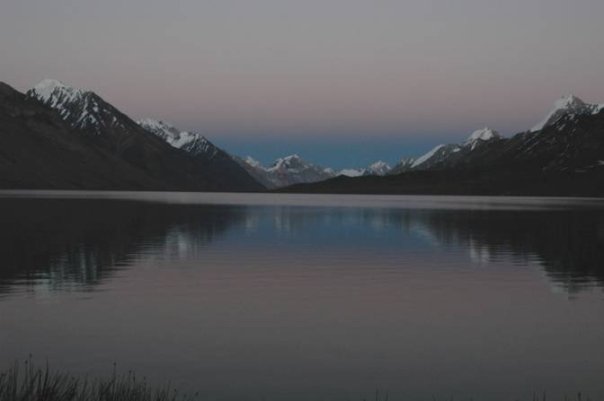
ہم اس کے بلند کنارے پر خیمہ زن تھے— کنارے سے نیچے اترۓ نیچے تو وہاں پانیوں کے پاس نرم اور پاؤں رکھنے سے دھنستی ہوئ گھاس بچھی تھی— اور کنارے کے ساتھ […] پتھر پانیوں میں دور تک دکھتے تھے اور پھر ان سے پرے گہرائی یوں گہری ہوتی تھی کہ جھیل کرومبر کی گہرائی کو آج تک کوئی نہیں جان سکا
We were encamped on the high bank of Lake Karamber – Below this high bank and nearer to the waters there was soft grass that sank deep when stepped upon. And along the bank […] there were stones in the water till far. Beyond them, it’s vessel so deepened that the depth of Lake Karamber has never been measured. —
پتھروں سے پرے جھیل کے اندر جو گہرائی تھی وہ اندھیری سیڑھیوں کی طرح تھی— کیا میں آخری سیڑھی پر دستک دے سکتا ہوں— میں زینہ بہ زینہ اس کے اندر تک جاسکتا ہوں
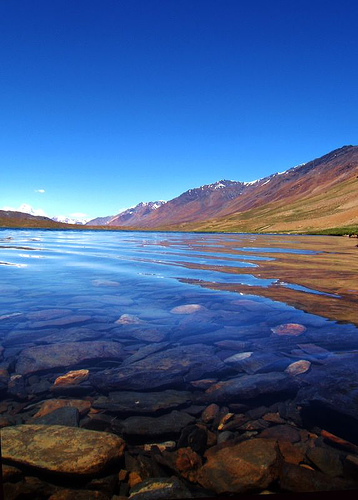
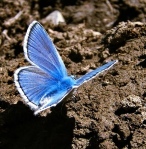
جھیل کرومبر کی سطح پر ابھی تک تتلیاں پرواز کرتی تھیں— وہ پانیوں کے حسن کو ستاتی تھیں اور ہم وہاں تاریکی اترنے تک بیٹھنا چاہتے تھے یہ جاننے کے لئے کہ کیا رات کو جگنو اسے ٹھہر کر دیکھتے ہیں یا نہیں
—
میں نے پہلی بار کرومبر جھیل میں اپنا ہاتھ ڈالا–
اور اس نے منجمد کردینے والی یخ بستگی میں میرا ہاتھ تھام لیا—
میں اس کے بدن میں تھا– اس کا ایک حصّہ تھا اور اس کی سرد مہری ختم ہوئی اور اس کی جگہ ایک نرم آسودہ گرمی میرے بدن کے ہر حصّے میں پنہچی– جھیل کرومبر میں جتنے پانی تھے میں ان کے اندر سانس لیتا تھا
I put my hand for the first time in the lake — And she grasped it with a freezing chill. I was in her body—a part of her. Her coldness ended and in its place a soft warmth reached every corner of my body—I was breathing inside all the waters of the lake.
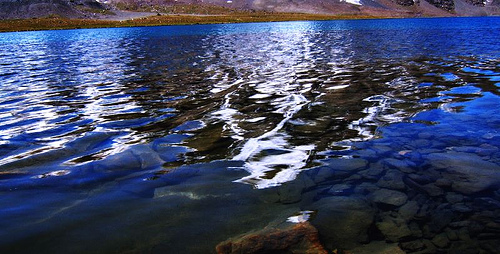
اور چراہ گاہوں کے سبزے کے اوپر معلق زینہ بہ زینہ بلندی میں کم ہوتے پہاڑ جو چٹی بوئی تک جاتے تھے- وہاں جہاں پورٹرز کے رزق کا دھواں معلق تھا اس کے عین اوپر بلند ترین چوٹی میں جیسے اس کا بسیرا تھا- […]— وہاں سورج کے ایک حصّے نے جھانکا […] اور میں بھی سورج کی بے یقینی میں مبتلا ہوا کہ وہ— جھیل کرومبر وہاں ہے کہ نہیں– [..] اور وہ وہاں تھی– اس پر براہ راست ابھی کرنوں کی یلغار نہیں ہوئی تھی صرف اندھیرے کو زائل کردینے والا سحر اس تک پہنچا تھا
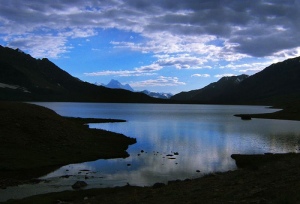
And finally the heavy-hearted departure…
اس منظر کی دل کشی پھر سے لوٹ آئی جیسے وہ کے-ٹو نما برف پوش بلندی پر ٹھہری ہوئی اسی لمحے کی منتظر تھی کہ کب یہ کوہ نورد جو میری تنہائی میں مخل ہوۓ تھے یہاں سے کوچ کریں اور کب میں پھر سے اپنے حسن کی ویرانی اور یکتائی کو مکمل کرسکوں– ہم نے اس جھیل کو ایک شب کے لئے آباد کیا تھا— […] تو ہم وہ تھے جن کی وہاں ضرورت نہ تھی
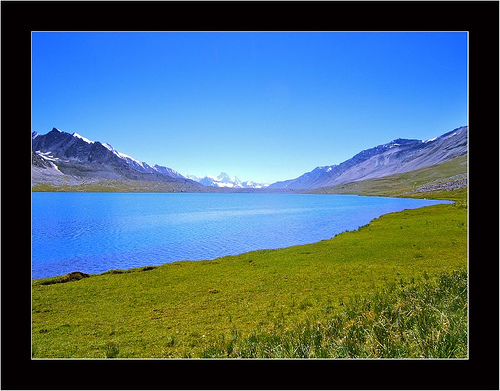
The Broghil Valley
Broghil valley lies at mere 10 minutes walking distance from the other side of Karamber. This is the Yak Sarai of the book’s titles. A vast expanse of greenery with settlements that depend on yaks for their living.
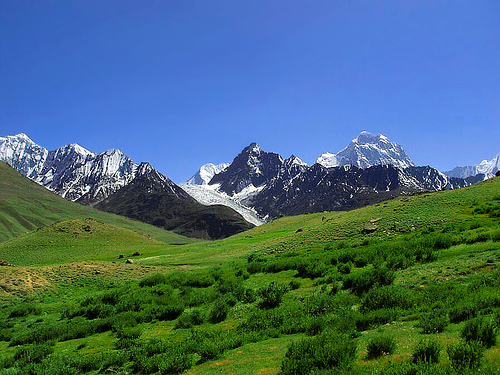
یہاں دائیں اور بائیں صرف یاکوں کی بستیاں ہی نہیں تھیں بلکہ سامنے بروغل کی فضاۓ بسیط بھی تھی- اس کے فراخ گھاس میدان ایسی وسعت اور اتنی دوری والے تھے کہ نظر ان کی حدوں تک پرواز کرنے سے قاصر تھی- ان کی حیران کن کشادگی میں سرد ہوا بھی اپنی تندی کھو رہی تھی اور ہم اس بلندی پر سے کہیں کہیں ان ندیوں کی جھلک دیکھتے تھے جو گھنی گھاس کے ٹیلوں میں کبھی پوشیدہ ہوجاتی تھیں اور کبھی ان کی پارہ چمک بجلی کے کونڈے کی طرح لپکتی اور گم ہو جاتی تھی جیسے ایک سبز آسمان زمین پر بچھا ہو اور اس میں بجلی چمکتی ہو
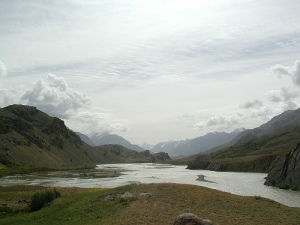
Pretty soon they all are dreaming of buying some yaks and crossing the terrible Darkoot Pass on yaks’ backs. This dream was not meant to be fulfilled, but it provides coming relief by serving as a back drop for some clever turn of phrases around the word yak.
اتنے سارے یاک دیکھ کر ہم بھی تھوڑے سے یاک ہوگئے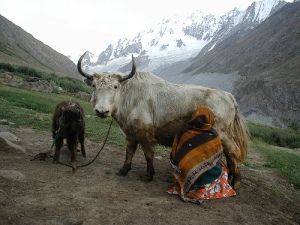
Seeing so many yaks, ourselves were getting yak-like…
—
جیسے یاروں کا یار ایسے یاکوں کا یاک
—
ہم سب اب یاکتی یاک ہو چکے تھے یعنی یاکوں کے خواب دیکھ رہے تھے
By now we were all yakty-yak …. that is, we were dreaming of having yaks of our own.
—
کاش میں یاک ہوتا— یا شاید میں تھا اسی لئے تو ہری ہری گھاس کو حسرت سے دیکھتا تھا
I wish I were a yak — or perhaps I already was; that is why I eyed the green grass pitiably.
—
دھوۓ گئے ہم ایسے کہ بس یاک ہو گئے
After the suprising beauty and mysterious strangeness of arshadghaas, where they stop for the night they enter a narrow strip of the broghil valley. Here, enjoying encounters with a lotus lake and a wakhi bride, they are walking side by side with the Wakhan corridor in Afghanistan.
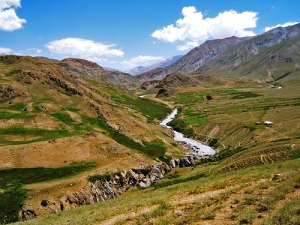
چٹان کے پہلو سے ایک راستہ ذرا پرے ہوتا تھا- […] اگر ہم اس پر چلتے ہیں تو اگلے چند لمحوں میں افغانستان کی واخان پٹی میں ہونگے اور اگر سفر جاری رکھتے ہیں اور انسانی سرحدوں سے چشم پوشی کرلیں تو آج شب ہمارے خیمے تاجکستان میں لگ سکتے تھے
A path drifted away on one side of the rock. […] If we took it up we would be on the Wakhan Corridor in Afghanistan in the next few seconds and if we kept up our pace, ignoring the boundaries created by humans, we could have camped tonight in Tajakstan.
One after another, they come across beautiful places, moments and people across the tiring length of Broghil and pass through Gurhil and Chilmarabad.
جب ہمت جواب دینے لگی— […] تو شاید رشوت کے طور پر ہمارے قدموں میں گھاس میں یہاں وہاں کچھ گلدستے بکھیر دیے گئے- یہ مختلف رنگوں کے ایسے پھول تھے جو دراصل ایک ہی پھول کی پنکھڑیاں تھیں […] ہر دو چار قدم کے بعد ایک ایسا بوکے گلدستہ قدموں کے آگے آتا تو میں بے اختیار مسکرا دیتا کہ یہ تو رشوت ہے– ہم اتنے تھکے ہوۓ تھے کہ کوئی بھی لالچ ہمیں آگے بڑھنے کی ترغیب نہیں دے سکتا تھا– لیکن– اب تو گل دستے پیش کے جارہے تھے تو ہم رک جاتے– کیسے آگے نہ چلتے
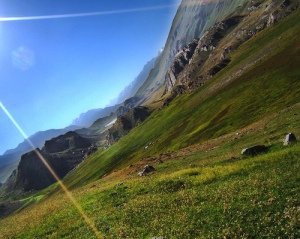
When our strength was breaking […] then, like bribes, boquets sprang up in our steps on the grass. These were flowers of different colors, actually the laid about petals of a single flower […] When every few steps such a boquet awaited our steps, I spontaneously smiled: that’s a bribe! — We were so tired no greed could induce our feet to drag further -but now we were being presented with such floral collections, could we stop now?
Finally, rising on a high plain, they come to Chikaar their gateway to Darkoot.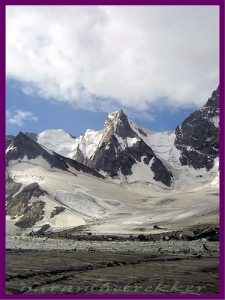
یہ وادی اور اس کا برفیلا حسن فریب ہی فریب تھا
This valley and its snowy beauty was pure guile.
Finding guides to lead them through the much dreaded Darkoot Pass, they spend the night at the high pedestal right beside the beginning of the all-snow pass, barely sleeping in the bone-freezing cold.
پندرہ ہزار فٹ کی اونچائی پر- ایک نا آشنا درے پر— دستک دینے سے پہلے ہم رکے تھے— اور یہاں صرف ہم تھے
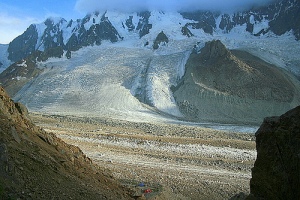
مکمل تنہائی، شہر میں نہیں، صرف ویرانوں میں- میری محبوب ہے–چپ بیٹھنے سے، قدرت کے طلسم کدے میں چپ بیٹھنے سے، ایک ابدی تنہائی میں ایک ذرے کی حیثیت سے، اپنے دھیان میں گم بیٹھنے سے ہی انسان مکمل ہوتا ہے- اس دھیان میں ہی بہت سے بھید کھولتے ہیں- بہت سے در وا ہوتے ہیں
Complete solitariness, not in cities, only in the wild deserted places, is a beloved to me. It is the silence, sitting in the nature’s magic-place, sitting as a speck of dirt in a solitude that has existed since the beginning of time, sitting lost inside one’s own self, this silence is what completes a human… Such many secrets are unravelled … so many doors open in the silence…
—
یہاں تو صرف آسمان تھا اور نیلاہٹ میں گھلا ہوا اور دور تک درکوت کا منجمد اور خاموش دریا تھا جس پر کل صبح ہم نے قدم رکھنا تھا
Here there was nothing but the Sky, deeply mixed with a blue dye and the quiet, frozen river of Darkot was laid beneath us, on which we had it step tomorrow morning.
—
اس کے پار جو چٹانوں کی وسیح دنیا تھی ان میں تہہ در تہہ اور پیچ در پیچ برفانی زینے تھے- برفوں کی بلندیاں اور ان کے بھید تھے- وہ عجب تھے— ان میں عمارتیں اور شکلیں تھیں- نوکدار چٹانیں آسمان میں چھید کرتی تھیں— وہ ایک قلعے کی صورت اختیار کرتے تھے، […] اس میں ایک شہزادی قید ہو سکتی تھی
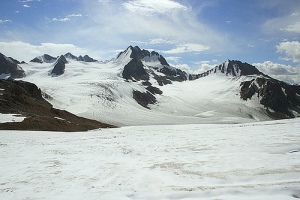
They wake up at four in the next morning, to attempt the crossing while the glacial waters were still frozen. Finally, having climbed the top of the Darkoot Pass, they find themselves at the head of a sharp drop of 6,000 feet into Rawat valley, back in Gilgit.
جب ہم نے برف پر سے زمین پر آخری قدم رکھا تو ہم چترال سے جدا ہوکر ایک مرتبہ پھر وادئ گلگت میں داخل ہورہے تھے— ہمارا رشتہ اس دنیا سے منقطع ہوگیا جس میں وادئ سوخترآباد کے سنو ٹائیگر تھے- سوئنج کی وہ آبشار اور سفید تتلیوں کی دھول تھی- کرومبر کے رنگ بدلتے پانی تھے- بروغل کی چراگاہیں تھیں اور ارشد گھاس کے میدان تھے– یاک سراۓ کا دروازہ بند ہوگیا
When we stepped at last from the snow on land, we had re-entered the Gilgit valley, the Chitral region left behind us. Our connection was cut off now from that world where the snow tigers of Sokhtarabad roamed, from that fall above the Swinje and from that butterfly dust- where the waters of Karamber changed colour- the pastures of Broghil and the fields of Arshadghaas — the doors of Yak Sarai were closed upon us.
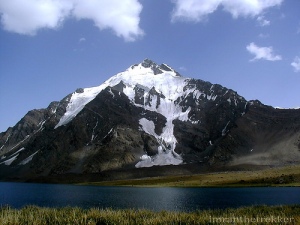
The journey has ended… or, so it seems…
کیا واقعی یہ سفر کا اختتام ہے؟
کونسا ایسا سفر ہے جو آج تک نکتہ عروج پر پہنچ کر ہمیشہ کے لئے ختم ہوگیا ہو—
کیا کوئی منزل ہوتی ہے؟
[…] سفر بھی تو آواگان کا ایک چکر ہے اور اس چکر میں آۓ ہوۓ بولے ہوۓ پھرتے ہیں- […]
صرف اس لئے کہ منزل کوئی نہیں— منزل کے سراب، دھوکے اور دکھاوے ہیں- اگر کچھ ہے تو بس وحشت ہے-
—
کل میں کہاں جاؤں گا؟
شاید وادئ شمشال کی طرف– شاید بتورہ کی برفوں کے لئے– اور ہو سکتا ہے اس جھیل کا قصد کروں جس کی روانی منجمد ہے- اشکولے سے پانچ روز کے کَڑِی مسافت کے بعد—- بیافو گلیشئیر کے آخری سرے پر— ایک جھیل ہے جو برف کی ہے– اسے سنو لیک کہتے ہیں
—
یعنی سفر کا اختتام نہیں ہوا تھا— اس کی ڈوری سنو لیک سے جا ملی تھی
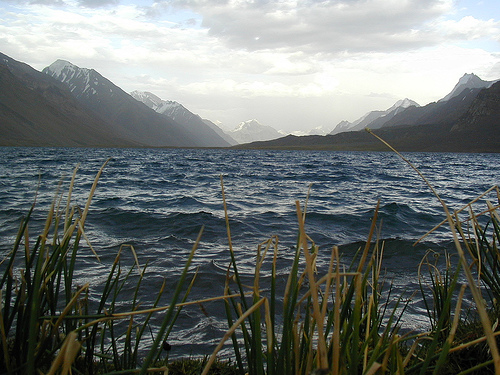
Notes:
The entry on the word August at dictionary.com
–adjective
| 1. inspiring reverence or admiration; of supreme dignity or grandeur; majestic2. venerable; eminent |
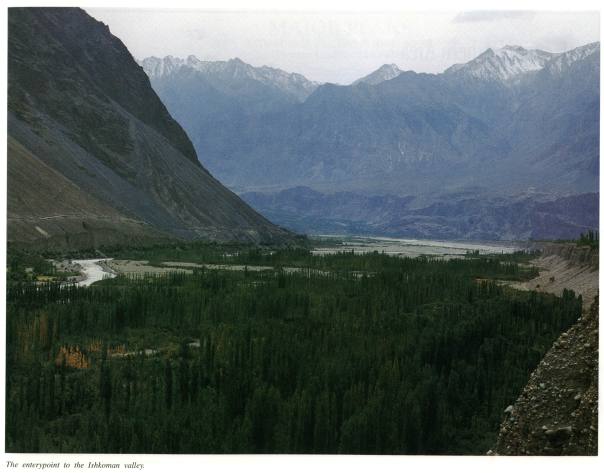
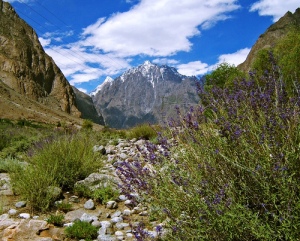 Source
Source